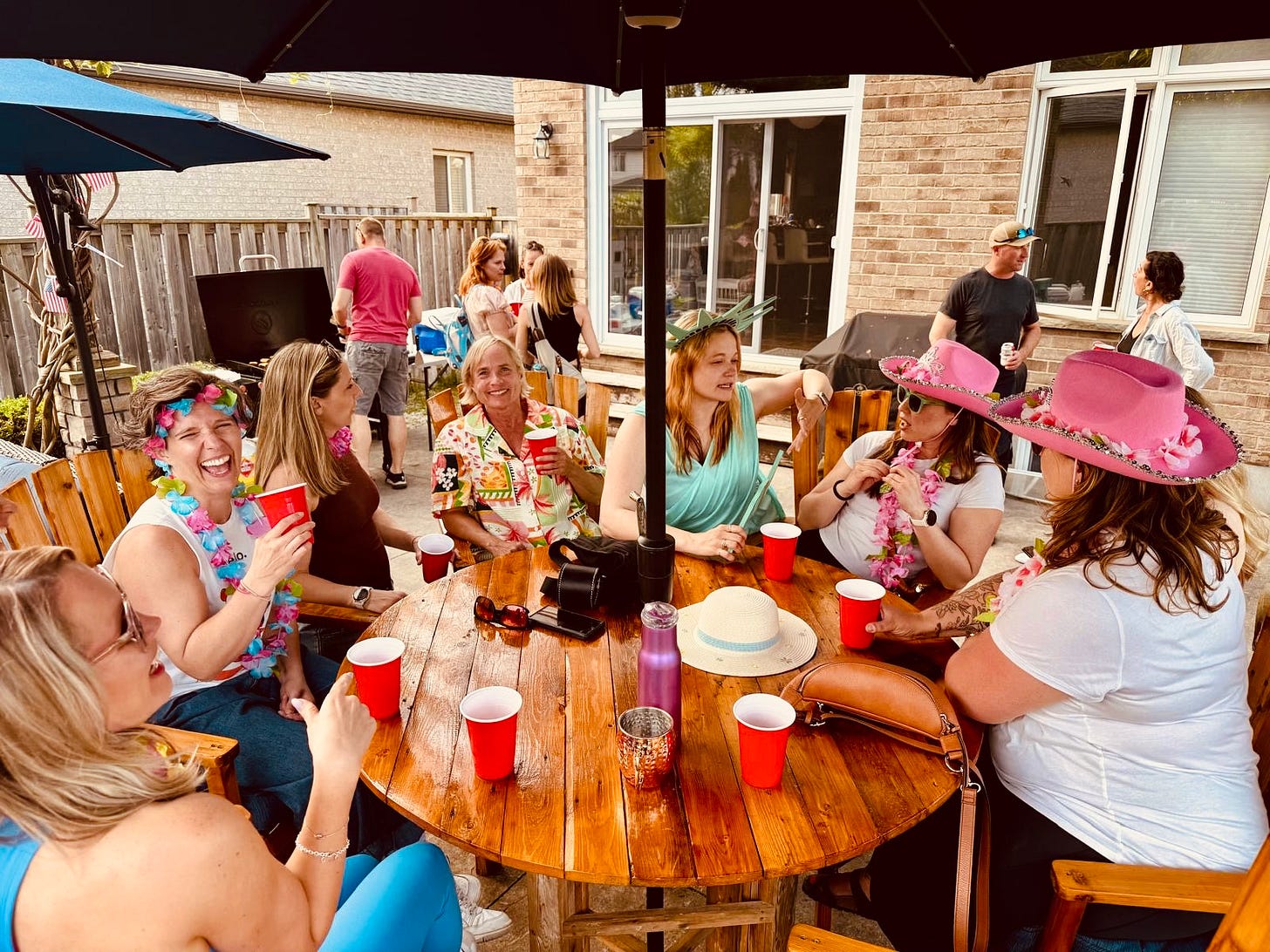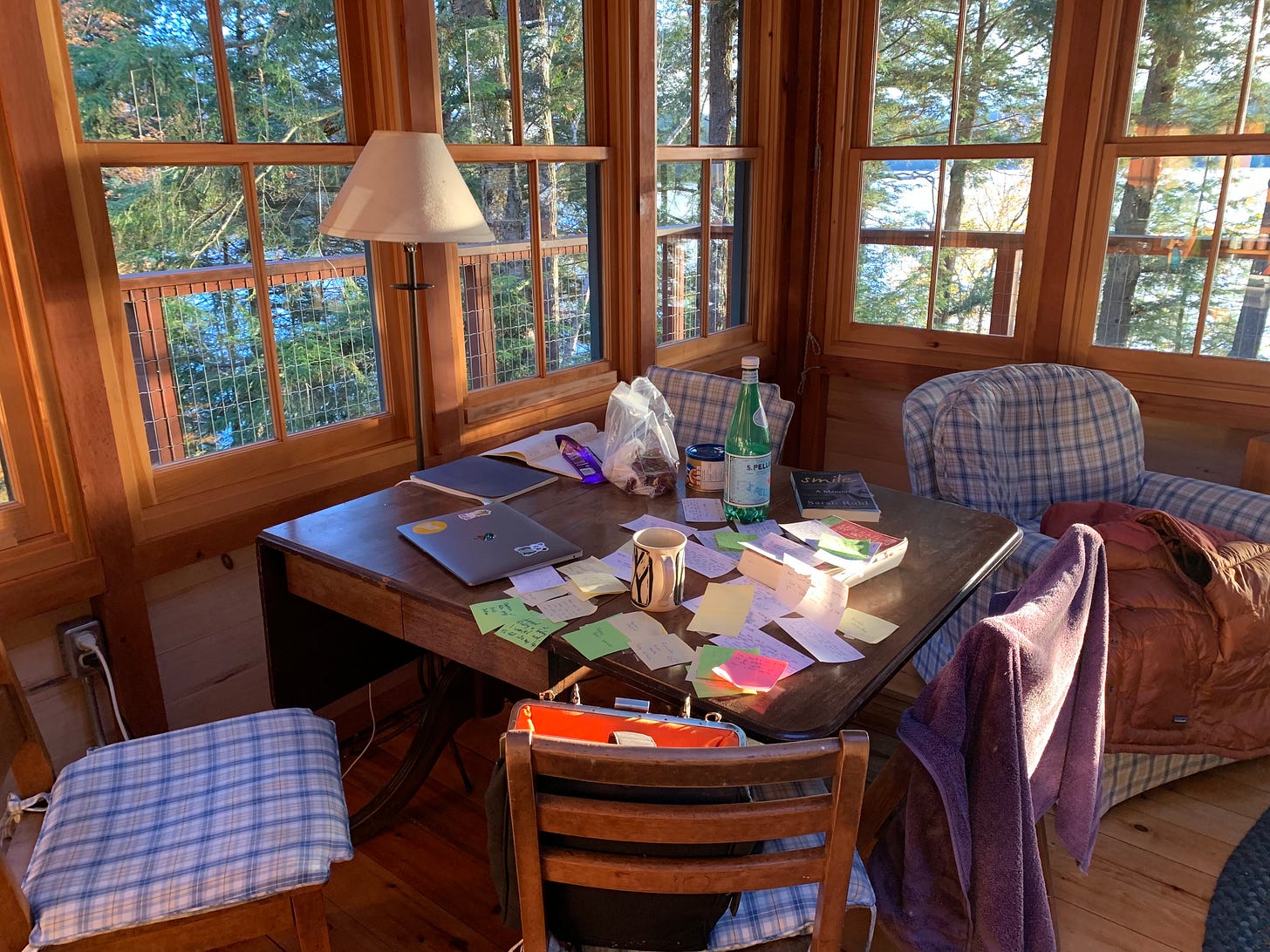How Can We Fend Off Loneliness?
A reader thinks our culture of 'rugged individualism' has backfired.
Three months ago, a reader asked me to write a piece on how to deal with loneliness. I’ve been thinking about it ever since, wanting to respond, yet not quite knowing how to do it justice. Today, I am going to try.
The reader described a situation that she thinks is common in the United States and Canada, where there’s a “persistent malaise and staleness in the air; church membership is declining; there is not enough activation energy or critical mass of people for anything to happen.”
She and her siblings live in different cities, hours apart. Her homeschooled children are older now, several have left the church, one is actively hostile. Homeschooling them seems to have been meaningful, but in her words, “it is a season, then there’s nothing left.” Her marriage poses some serious challenges. Her town has not yet seen a revival in social activities, post-Covid.
“Our [American] culture was founded upon the myth of rugged individualism. It’s a tough society, and easy to feel alienated.” And so, she finds herself turning to her phone out of necessity. “Sometimes, if not for podcasters, there would be no human voices in my day.” She likened it to the elderly, living in care homes, who watch Mr. Rogers just to feel less alone.
She finished, “I wonder if you have advice for me. I don’t want to live on my phone, but sometimes there’s just nothing else.”
The Agony of Isolation
My heart ached, reading her email. I wished I could invite this woman to my house to share a pot of tea and a deep conversation, but we live in different countries. We’ll likely never meet in person, but I will do my best to offer some advice. I have not experienced the same level of persistent loneliness that she describes, though I have had shorter bouts of intense isolation.
The first time was when I moved abroad at age 16, to the island of Sardinia, for a one-year exchange program. I knew no one, couldn’t speak the language, had very limited means of communication with my family back home (this was in 2003), and it was brutally lonely for several months. I cried myself to sleep most nights. I also gained 30 pounds because I ate to console myself.
Another time was in 2010, when I moved to the small town where I live now. I had a new baby, no car, and a partner who did shift work, often working nights. I had just left a vibrant, busy life in downtown Toronto, and I was struggling greatly with the loss of my student identity, my post-graduate plans, my part-time job, my freedom—all derailed by the arrival of an unplanned child and a necessary, practical move to a rural community. I knew no one, and the lack of social connection felt physically painful.
These are not exactly the same as what she describes, but I hope that some of the lessons I gained from those experiences might be applicable to her situation—and to that of others who are also suffering from loneliness.
As recently as 2023, the then-Surgeon General Vivek Murthy issued an official advisory about the serious health risks associated with America’s “epidemic of loneliness and isolation.” He warned that the physical consequences of poor social connections can be devastating, “including a 29% increased risk of heart disease; a 32% increased risk of stroke; and a 50% increased risk of developing dementia for older adults” (via NPR).
As a solution, the advisory proposed “six pillars to advance social connection,” which included strengthening local infrastructure, enacting pro-connection public policies, mobilizing the health sector, reforming digital environments, deepening our knowledge, and building a culture of connection. This may be a useful framework for some, but it struck me as overly vague and high-level, out of touch with the hands-on daily work needed to cultivate a sense of belonging and a real-life social network.
Leave the House
So, what’s required? I do believe it is fundamentally necessary to get out of one’s home on a semi-regular basis. That’s the only way to meet people in person, and we know that in-person interactions are of higher quality than virtual ones. It’s OK if some friendships are virtual, but that is not where a majority of one’s social interactions should occur.
How does one get out of the house? That depends on who you are, what you like, where you live. You could get a job, even just part-time, that brings you into contact with other people. When I asked my dad, he said, “Join an outdoors club. Then you can meet people and spend time in nature.” He mentioned that that’s how a close friend met his wife upon moving to a new city.
I don’t know of any outdoors clubs in my town, but another idea could be joining a running or rowing club, a beach volleyball team, a beginner women’s hockey team (I’ve wanted to do this for years), an introductory CrossFit, Pilates, or yoga class, or a dance class. I like the idea of moving and exercising at the same time as opening oneself up to social interactions, because then multiple benefits occur.
A single male friend of mine swears by his birding group; he loves getting up early in the mornings to hike and identify birds with an enthusiastic group that, admittedly, is much older than he is. But multi-age gatherings and friends of diverse ages are wonderful to have, too. And I’ve heard that birding is like an addictive scavenger hunt!
After a few lonely weeks in my new small town, I was invited to a knitting group. I’d never knitted before in my life, nor had the slightest interest in it, but I figured I could learn if it meant having adult conversation one night per week. So, I went—and liked it. I made a few lumpy scarves, which led to an invitation to join a book club, which, again, had a reading list that didn’t exactly excite me, but I did it anyway because it meant some great female companionship, snacks, and wine once a month.
A great inspiration and resource for this concept is a new documentary film called “Join or Die”, which proposes that participating in religious groups, service groups, and other social gatherings is key to overcoming much of the political polarization that’s currently tearing many countries apart.
Make Things Happen
I’ve concluded over the years that many people are desperate to receive invitations to do things, but few people know how to extend them. The best way to ensure that you have things to do is to plan events yourself, to become the social aggregator that’s needed often to get the ball rolling. It doesn’t take much. If you suggest a potluck dinner party, there’ll be eager takers, and if everyone makes a dish, you don’t have to do much else, other than tidy up your house.
One of my favourite events is the Ladies’ Bike Around the World tour that I’ve organized annually for the past eight years. It keeps growing, as more women ask to participate. From the outside, it looks like an enormous endeavour, but in reality, it just takes some initiative on my part and a moderate amount of organizing, then everyone does their part to make it happen. We end up having what many women describe as “the best day of the summer.”
I’ve organized countless impromptu one-off events focused on food, e.g., a crepe party (I make the huge stack of crepes, guests brings toppings), a strawberry social, a homemade bagel party (again, guests bring the lox and cream cheese, and help roll and boil), a donut-making party (that’s our annual Halloween tradition), a gingerbread house-making party for kids, etc. If hanging out with people you don’t know well feels awkward, making food together takes the pressure off making small talk.
So, general advice for anyone facing an empty weekend and wishing they had something to do, why not be the one to plan it? Others will likely be appreciative of your effort, and some will reciprocate, and then you might have the tentative beginnings of a new social network forming.
Friend-Dating
I kid you not when I say that I keep a mental list of people I want to befriend. My husband thinks it’s weird and slightly creepy; I think of it as strategic. I joke that it’s my friend “hit list”, where I note individuals who seem very cool, interesting, or fun, and then target them in a deliberate effort to become friends. I make a point of engaging them in conversation when our paths cross, including them in group events, or sometimes even inviting them out for a one-on-one coffee.
I think of this as “friend-dating,” and why not? People do it for potential romantic relationships all the time, and I think it can be a valuable model for friendships, too. Plus, if I leave it up to chance encounters, it might never happen. So, if I’m truly intrigued by another woman, I invite her over for tea or coffee, perhaps with a mutual friend to make it less awkward, but sometimes without.
If you don’t have potential friends to target, what about your actual physical neighbours? Start with the people who live right nearby. Invite them over for tea and a short visit. Put a time limit on it so no one feels trapped; and if you both have fun, do it again.
Embark on a Project
I think that loneliness can be mitigated not just by other people, but also by a sense of purpose in one’s own life. Writing my book was one of the most exhilarating and meaningful periods of my life, when it didn’t matter that I spent countless hours and weekends cooped up alone in front of my computer; I was working on something important, something bigger than me, and it was profoundly satisfying.
My mother, an artist, spends a day each week painting deep in Algonquin Provincial Park, often in very remote settings accessible only by canoe, and she revels in the solitude because she is doing what she loves. She never feels lonely, but rather a profound sense of doing what she is meant to be doing.
Is there a creative, artistic, or physical project you can throw yourself into? It could be a new challenge, like learning an instrument you always wanted to learn, or a language, or getting better at cooking, or making pottery, weaving, or sewing, or learning carpentry, or putting yourself on an intensive Classics reading program, or whatever.
A project could also take the form of community service. Back in 2015, I started a refugee sponsorship group (in partnership with Mennonite Central Committee) that grew enormously and took on a life of its own; it consumed much of my time and energy for several years, but we managed to fundraise over $100K and sponsor 19 refugees from Syria and the Congo to come to Ontario. While I’m not involved in that work anymore, it gave me a tremendous sense of purpose at the time, and that was how I met some of my closest friends.
Consider Relocation
Another piece of advice my dad offered when we briefly discussed my reader’s question was, “Move to a small town.” I don’t know where the reader lives, but he pointed out that it is much easier to find community in a place where you bump into the same people over and over again, and where the mentality tends to be one of curiosity and genuine investment in others.
I can attest to this. After overcoming my initial misery at leaving Toronto for a town with a population of 8,000, I grew to appreciate it (though it took a few years). Now, I love the fact that people know me, and I know them, and everyone’s got a collective eye on my kids, who roam freely. It’s the kind of place where you are motivated to help each other, because you never know when your paths will cross again (and they most certainly will).
Deprioritize Your Phone
The phone can be a tempting substitute for real social connection, but it can become an obstacle, a reason not to make plans or develop other interests because you know the phone will always be there to distract and entertain you. If you can somehow take it out of the equation, make it a non-option, what does that force you to do?
For example, if you only let yourself watch Netflix on weekends, or delete social media altogether, or force yourself to call friends instead of text them, or only text with an explicit goal of making plans, then what kind of opportunities might start to present themselves?
Don’t Give Up!
Relationship-building is a skill that takes practice, and each person must find what works for them; it’s not one-size-fits-all. These tactics have worked for me at various points over the years, and I hope some might be of use to my reader-friend and any others in a similar situation.








The disconnection we’re feeling is more than personal, it’s cultural. As a mother of young children, I see how loneliness doesn’t only touch adults. Our kids feel it too. It shapes their childhoods in ways we don’t always recognize. These suggestions for finding community are so helpful, especially the reminder to take initiative and become the social aggregator. I’ve done this, for myself and for my children, and it does help. But still, there’s something undeniably sad about how much effort it takes. That neighborhood kids can’t just run out and play. That even a playdate with someone two doors down has to be scheduled in advance. It’s a quiet loss we don’t talk about enough. I just wrote a post about the loneliness of my own neighborhood. Thank you for writing on this subject.
I agree it is vital to get out and do things and to actually talk to people, even if it is a simple hello. If you want people to invest in you, then you have to invest in other people. Volunteering is the best way to do that and helping others makes you feel good. But even if you live in a place with not a lot going on, even just going to a coffee shop each day at the same time to read, for example, can help create a sense of community and connection, especially if you take the time to say hello to the workers and other people who frequent the place. It is also important to say yes to invitations or other opportunities even if they are outside your comfort zone because you never know who you will meet or where it may lead.